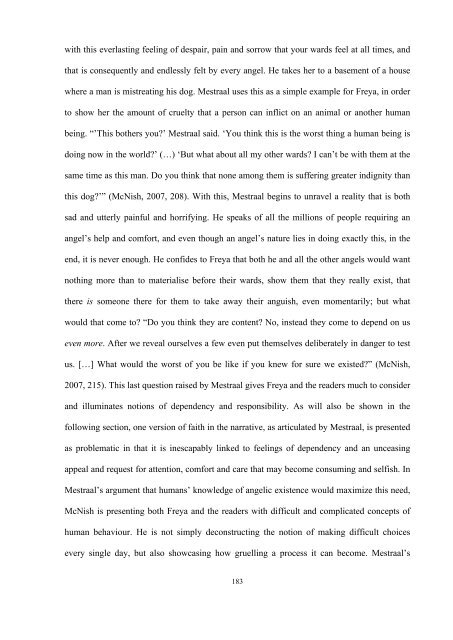The secular angel in contemporary children's literature: David ...
The secular angel in contemporary children's literature: David ...
The secular angel in contemporary children's literature: David ...
You also want an ePaper? Increase the reach of your titles
YUMPU automatically turns print PDFs into web optimized ePapers that Google loves.
with this everlast<strong>in</strong>g feel<strong>in</strong>g of despair, pa<strong>in</strong> and sorrow that your wards feel at all times, and<br />
that is consequently and endlessly felt by every <strong>angel</strong>. He takes her to a basement of a house<br />
where a man is mistreat<strong>in</strong>g his dog. Mestraal uses this as a simple example for Freya, <strong>in</strong> order<br />
to show her the amount of cruelty that a person can <strong>in</strong>flict on an animal or another human<br />
be<strong>in</strong>g. “’This bothers you?’ Mestraal said. ‘You th<strong>in</strong>k this is the worst th<strong>in</strong>g a human be<strong>in</strong>g is<br />
do<strong>in</strong>g now <strong>in</strong> the world?’ (…) ‘But what about all my other wards? I can’t be with them at the<br />
same time as this man. Do you th<strong>in</strong>k that none among them is suffer<strong>in</strong>g greater <strong>in</strong>dignity than<br />
this dog?’” (McNish, 2007, 208). With this, Mestraal beg<strong>in</strong>s to unravel a reality that is both<br />
sad and utterly pa<strong>in</strong>ful and horrify<strong>in</strong>g. He speaks of all the millions of people requir<strong>in</strong>g an<br />
<strong>angel</strong>’s help and comfort, and even though an <strong>angel</strong>’s nature lies <strong>in</strong> do<strong>in</strong>g exactly this, <strong>in</strong> the<br />
end, it is never enough. He confides to Freya that both he and all the other <strong>angel</strong>s would want<br />
noth<strong>in</strong>g more than to materialise before their wards, show them that they really exist, that<br />
there is someone there for them to take away their anguish, even momentarily; but what<br />
would that come to? “Do you th<strong>in</strong>k they are content? No, <strong>in</strong>stead they come to depend on us<br />
even more. After we reveal ourselves a few even put themselves deliberately <strong>in</strong> danger to test<br />
us. […] What would the worst of you be like if you knew for sure we existed?” (McNish,<br />
2007, 215). This last question raised by Mestraal gives Freya and the readers much to consider<br />
and illum<strong>in</strong>ates notions of dependency and responsibility. As will also be shown <strong>in</strong> the<br />
follow<strong>in</strong>g section, one version of faith <strong>in</strong> the narrative, as articulated by Mestraal, is presented<br />
as problematic <strong>in</strong> that it is <strong>in</strong>escapably l<strong>in</strong>ked to feel<strong>in</strong>gs of dependency and an unceas<strong>in</strong>g<br />
appeal and request for attention, comfort and care that may become consum<strong>in</strong>g and selfish. In<br />
Mestraal’s argument that humans’ knowledge of <strong>angel</strong>ic existence would maximize this need,<br />
McNish is present<strong>in</strong>g both Freya and the readers with difficult and complicated concepts of<br />
human behaviour. He is not simply deconstruct<strong>in</strong>g the notion of mak<strong>in</strong>g difficult choices<br />
every s<strong>in</strong>gle day, but also showcas<strong>in</strong>g how gruell<strong>in</strong>g a process it can become. Mestraal’s<br />
183
















